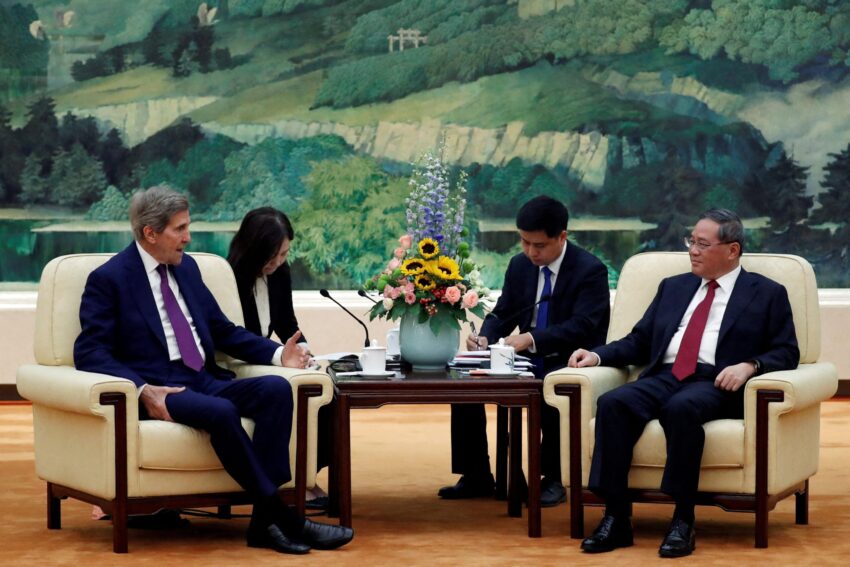US climate envoy John Kerry visited Beijing, re-starting talks on coal, methane and other climate issues
As temperatures reached above 35C (95F) this week in China’s capital, US climate envoy John Kerry met Chinese counterparts in an attempt to “unstick” climate talks frozen last year over the issue of Taiwan’s sovereignty.
Kerry spoke late into the night with his counterpart Xie Zhenhua and, in a sign of warming relations, met with China’s second most-powerful man Premier Li Qiang and foreign minister Wang Yi.
With the broader US-China relationship hostile, expectations were low but experts cautiously hailed the visit as a success.
Greenpeace East Asia analyst Li Shuo called it “an important step in what will be a complex rescue operation” while the Asia Society’s Thom Woodroofe called it a “small win”.
Pleased to host a dinner for China Special Envoy for Climate Change Xie Zhenhua and Secretary John Kerry, Special Presidential Envoy for Climate, as we seek to deepen our joint work on the climate crisis. @ClimateEnvoy pic.twitter.com/LUt0d3VNCz
— Ambassador Nicholas Burns (@USAmbChina) July 19, 2023
While officials met in Beijing, China was going through a record-breaking heatwave; one of several impacting the northern hemisphere at the moment. Some locations in the country’s arid Northwest recorded temperatures as high as 52C (125,96F).
Heatwaves have become more intense in recent decades as a result of the climate crisis, especially in cities, according to a report by the UN panel of climate scientists.
Now, both the US and China are planning two more meetings before Cop28 in November. They will talk about topics like better integrating China’s booming renewable sector into its coal-dominated electric grid and tackling methane emissions.
But the Chinese government warned that tensions over Taiwan could still scupper the talks. Chinese state media said that climate talks “cannot be separated from the overall environment of Sino-U.S. relations” and that the US should “properly handle the Taiwan issue”.
UAE’s Cop28 president plans “brutally honest” climate summit
Coal to renewables
After the first day of talks, Kerry highlighted “the challenges of coal and methane pollution” as the priorities for joint climate action.
In a press conference at the end of his visit, he praised China’s growth in renewable capacity but said that the US believes China has more coal power plants than it needs.
The two sides will discuss “scaling and integrating of renewable energy into the power sector in order to be able to reduce coal emissions”, he said.
China is rolling out renewables rapidly. This year, China will install more solar power than the US has installed in its history.
But the share of China’s electricity which is provided by these renewables is growing much slower because of unfinished paperwork and bureaucracy.
Since US president Joe Biden’s election, the US has prioritised measures to tackle methane, a particularly potent greenhouse gas which is emitted from fossil fuel infrastructure, farms and landfills.
China has not joined US and EU-led schemes to reduce methane emission. The government has long been drafting its own methane reduction strategy but it has yet to be released.
Kerry said that including methane in climate efforts would be a subject of further discussions.
US ban on Chinese panels
For the Chinese side, a priority is for the US to overturn its tariffs on Chinese solar panels, which have harmed the roll-out of solar energy in the USA.
Kerry rejects “climate reparations” but praises loss and damage fund
Kerry told a reporter from state-owned China Central Television that the subject “was raised with me” and that he would pass that concern on to the relevant ministers.
A state media report of Kerry’s meeting with Li Qiang said that developed countries like the US “should take the lead in reducing emissions and fulfill their financial commitments as soon as possible”.
Rich nations have collectively failed to honour their promise to give developing countries $100 billion a year to fund climate projects by 2020, with the US largely responsible for that failure.
Rocky few years
US president Joe Biden appointed Kerry as his climate envoy shortly after he was elected in November 2020. Three months later, China’s president Xi Jinping brought Zhenhua out of retirement to be his climate envoy.
The appointments were seen as a boost to the chances that the two sides could work together on climate change, as they did under the Obama administration to bring about the Paris agreement in 2015, due to the two men’s long and friendly relationship.
After dozens of virtual and several in-person meetings, these hopes were further boosted at the end of 2021 when the two sides announced a joint agreement on climate at the Cop26 climate talks in Glasgow. Both sides committed to discuss measures to reduce methane emissions.
Powerful officials and experts from both countries were supposed to begin discussions on issues such as clean electricity, the circular economy and city climate action, as well as methane, in September 2022.
But in August 2022, the head of the US House of Representatives Nancy Pelosi went on an official visit to Taiwan, an island nation off China’s east coast that the Chinese government considers part of China.
China reacted by cancelling the climate talks, a move Kerry called “both disappointing and misguided”. Instead of cooperating, official from both sides engaged in public Twitter spats over their climate records.
A few months later in November, tensions cooled after Biden and Xi had a productive meeting on the sidelines of the G20 in Indonesia. They agreed to work together on climate change and their climate teams, both of which were at Cop27 in Egypt at the time, were allowed to talk formally again.
After that meeting, the US announced that its top foreign affairs official Anthony Blinken would visit China. That trip was ca
Read More

